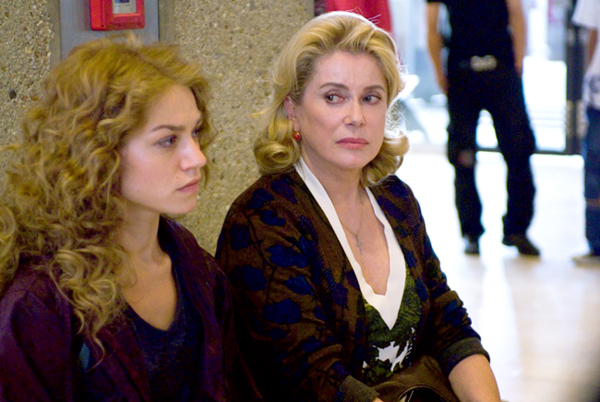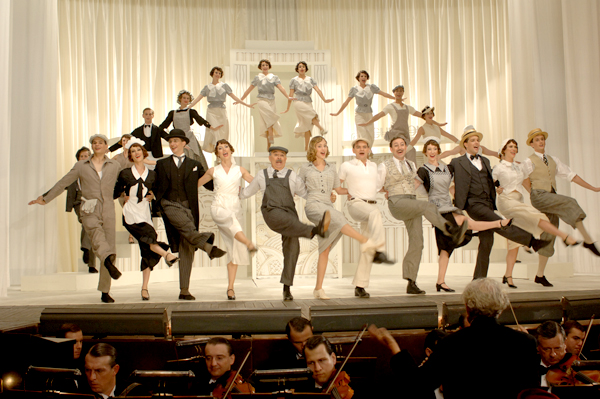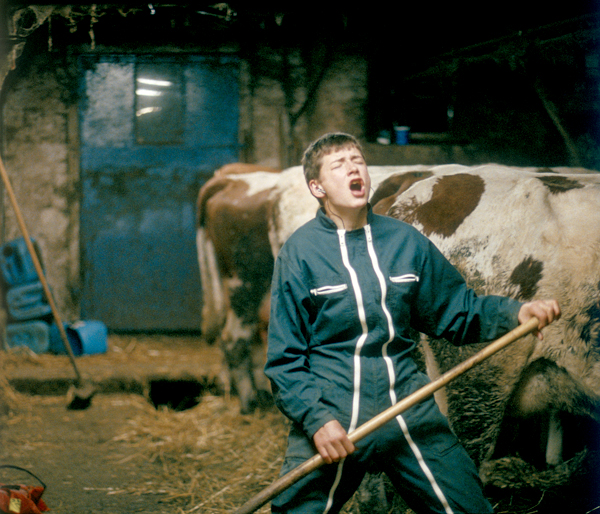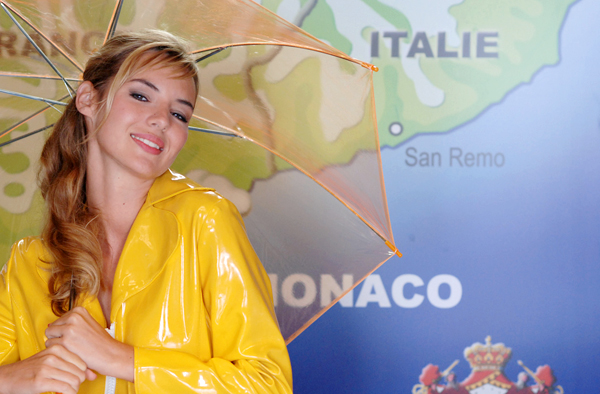|
Reviews of Recent Independent, Foreign, & Documentary Films in Theaters and DVD/Home Video

RENDEZ-VOUS WITH FRENCH CINEMA 2009 Any festival would be lucky to host the premiere of a film by André Téchiné or Agnes Varda. Even the works of newly established and up-and-coming directors give a boost to the 14th edition of Rendez-Vous with French Cinema at the Film Society of Lincoln Center. This year’s collection of French box-office and award-winning films make it stronger than previous outings, with way more hits than misses. Out of 16 films screened, at least five stand out, a high ratio for any showcase, with only two clunkers in the bunch. Téchiné’s unsettling The Girl on the Train is his best film in years and already one of 2009’s highlights, freely inspired by a sensational real-life media furor. Often the director crams too many themes and characters into his issue-laden portraits of contemporary France, but not here. He’s a lucid storyteller, drawing you in to believe that the film will center on the romance between a somewhat aimless young woman, Jeanne, and her controlling boyfriend. But in the second half, Jeanne’s abrupt and strangely enigmatic behavior will confound the audience—yet the film never loses its credibility or its cohesion. As Jeanne’s mother, a very maternal Catherine Deneuve offers her warmest performance in years. Agnès Varda, the doyenne of the French New Wave, reinvents the autobiography with The Beaches of Agnès, the only documentary in the series, which just won the Cesar Award for best documentary. Starting out from her childhood home in Belgium, Varda revisits her favorite beaches and muses on their associations with different periods in her life. Varda parades clips from her diverse films and multimedia exhibitions to reveal how she drew upon her own life experiences, and reunites with the real people who inspired or helped her. The director’s disciplined technique masterfully blows away those self-involved videomakers who confuse the narcissism of constantly filming their lives with the art of autobiography. Constantly on the screen, with her distinctive bowl bob, Varda’s just as interested in listening as talking. While the film’s emotional centerpiece of the film is her long marriage with the late director Jacques Demy (and she is very frank about their lives together), this is very much a portrait of a feminist artist who was no mere appendage or muse to a man. This film is her generous 80th birthday present to the world and will be released by Music Box later this year. For the fourth time, director Danièle Thompson collaborates with her actor son Christopher. Their Change of Plans is a wry and less sentimental exploration of sex, romance, and getting older than their previous charmers La Buche and Avenue Montaigne. Playing on the coincidences of the French drawing room comedy, updated with rock ‘n’ roll and cell phones, a dinner among a group of friends has a lasting impact on all. Each of the 11 lead actors, including Patrick Bruel and Emmanuelle Seigner, gets a turn to act silly or poignant, sympathetic or callous, as their characters struggle with careers, affairs, health, and the Paris traffic.
The two-part and often exciting gangster epic Mesrine opens with the warning, or disclaimer, “All films are fiction.” You’re likely to Google the name of Jacques Mesrine afterwards to separate fact from fiction in this incredible tale, though the film was partly based on the man’s autobiography. Director Jean-François Richet (Assault on Precinct 13) is proof that Luc Besson is not the only French filmmaker taking his cues from an American playbook. Transforming from a middle-class Algerian War vet to international notoriety, Mesrine’s audacious pattern of behavior is set in part one and carries over in part two, though more maniacal. (With a combined running time of 245 minutes, Mesrine will be released this summer by Senator Entertainment.) Several of the films in the program look at the new faces in France. With Eden Is West, Costa-Gavras takes on the human comedy and tragedy of European immigration issues as he continues, after four decades, to make politically engaged films. From a fictional Mediterranean country, Elias (Italian actor Riccardo Scarmarcio, like a wide-eyed Harpo Marx muted by language barriers) jumps from a smuggler’s freighter and is soon lured into the bed of a German tourist at a holiday resort. As Elias then sets out on an odyssey across Europe, this road movie pushes a confusing jumble of emotional buttons—sometimes his hapless adventures are played for laughs and sometimes for pathos. A heat wave exacerbates the travails of an African immigrant family and casts a yellowish glow over François Dupeyron’s With a Little Help from Myself. The director (Monsieur Ibrahim) has said in an interview that Félicité Wouassi was reluctant to take her first lead role as Sonia, the downtrodden mother of four who faces more vicissitudes than Job, because she was concerned about the script’s stereotypes of teen pregnancy, drug dealing, and domestic violence. But he was able to convince her that the film’s really a portrait of a family. Fortunately, her performance rises above unendingly complicated plot straits that strain credulity. That the family at the center of Claire Denis’s 35 Shots of Rum is of African heritage is fairly incidental. The relationship between college student Josephine (Mati Diop, luminous in her screen debut) and her widowed father leisurely unfolds almost purely, and poetically, From the opening scenes, repeated images of the tracks of the commuter trains he drives indicate the physical borders he has crossed—though an actual trip to resolve issues about Josephine’s mother seems tacked on.
Sylvie Verheyde’s autobiographical Stella looks to an earlier point when everything changes. Set in the kitsch-free 1970s, the titular 11-year-old struggles academically at a new prestigious school while she observes her parents’ fractured marriage in their unconventional home, a working-class bar-cum-flop house. Her crush on "a hood," one of the regular customers (poignantly played by the late Guillaume Depardieu in one of his last film roles) tenderly gives her surprising support, and is quite sweet. In the multiple-Cesar-winning film, Yolande Moreau is startlingly emotive in the almost nonverbal role of Séraphine de Senlis, a poor housekeeper in a pre-World War I backwater in Martin Provost’s beautiful biography of the rediscovered outsider artist, Séraphine. At first glance, she is an obsequious, seemingly stunted employee. A good way into the film, her secret talent is revealed, and her eccentric behavior is suddenly reinterpreted. The second half is more straightforwardly biographical, but just as absorbing, when the inspired painter is discovered by Wilhelm Uhde (Ulrich Tukur), the German champion of modern and “primitive” artists. Séraphine will be released by Cinema Guild later this year. On a much lighter note, Ilan Duran Cohen’s genre bending The Joy of Singing reverses the usual gender assumptions of the policier. An unremarkable thriller would have had an aging male cop aggressively seduce his young female rookie partner and bulk up his ego further by bedding a confidential informant who turns out to be a prostitute. But in a gender-roles switch, Muriel (the deadpan Marina Foïs) is such a frequently naked bundle of insecurities that this comedy is more like Prime Suspect played for laughs. She and an assortment of spies and informants go undercover at an opera singing class to spy on a student, a uranium trafficker’s widow (frilly and girlish Jeanne Balibar), who is just experiencing her first notes of freedom, sexual and otherwise. Claude Chabrol’s disappointing tribute to Georges Simenon and Agatha Christie, Bellamy, is a pale follow-up to his baroque A Girl Cut in Two. Burly Gérard Depardieu stars as a famous police detective bumbling his way through an investigation of an insurance executive on the lam who failed faking his death. But who was the decapitated victim in the exec’s place? This is one meandering mystery where the audience will feel smarter than the master sleuth, who overlooks one big clue. (Then again, Chabrol’s films are hardly about closure.) Atypically, the director pays little attention to the larger picture of corruption in high places, and instead focuses on Bellamy and his bumpy yet mundane relationship with his drunken, defeated brother.
Last and
least: if a man had directed The Girl from Monaco, this
erstwhile comedy would be labeled misogynistic—a charge that would
stick. The beautiful title character, Audrey, is a bleached-blond,
gum-smacking, vacuous, and ambitious wannabe princess. That she chooses
to yield her sexuality to get what she wants could be considered
empowering, if she hadn’t slept with the entire male population of the
principality. The film lacks the perception of the director Anne
Fontaine’s previous films Nathalie or How I Killed My Father,
as does her main character, a high-profile attorney, who is a mastermind
in the courtroom but blind to Audrey’s transparent and tiresome
manipulations. Nora Lee Mandel &
Kent Turner
|




